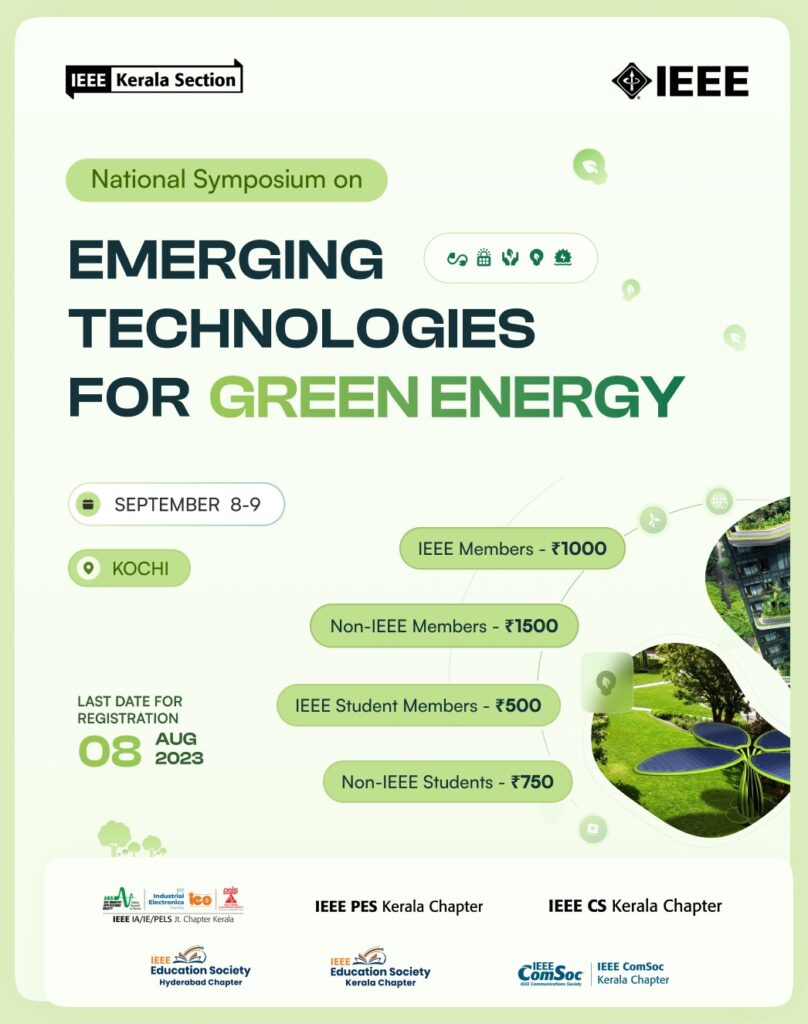Home » Symposium on Emerging Technologies for Green Energy
Symposium on Emerging Technologies for Green Energy
By chaithanya
09 September, 2023
Symposium on Emerging Technologies for Green Energy

Session 1: Expert Session on Green Hydrogen
The discussions in this session were related to green hydrogen and fuel cells. The speakers discussed the potential of green hydrogen in various industries and its use as a fuel source. They also talked about the challenges faced in the Green Hydrogen economy, its safety standards, and regulations. The sessions also highlighted the potential use of fuel cell technology in the maritime domain and Kerala’s roadmap for green hydrogen production.
Session 2: Expert Session on Energy Storage and Grid Stability
The presentations by the three speakers were met with enthusiasm, and an amazing discussion ensued, exploring various aspects of energy storage, grid stability, and the integration of renewable energy sources. Each speaker brought a unique perspective to the table, enriching the overall understanding of the topic. In conclusion, the session underscored the importance of energy storage, grid stability, and the collaborative efforts required from both industry and academia to address the challenges posed by renewable energy integration. The speakers provided valuable insights into various aspects of the topic, setting the stage for further exploration and research in the field. The event was a resounding success, leaving attendees with a deeper understanding of these critical topics and a sense of inspiration for future research and development in the field.
Session 3: Expert Session on Challenges in Renewable Energy
The session discussed Kerala’s wind potential, emphasized India’s goal to meet the Paris Agreement by 2050 and outlined plans for renewable energy to save 10 trillion dollars by 2060. Key milestones for carbon emission reduction by 2030 were addressed, along with the significance of electricity as the primary energy carrier. He also covered topics like hydrogen, electrification, and hard-to-abate sectors, showcased record electricity demand, and noted challenges due to weak monsoons impacting coal-fired plant closures. Global energy trends like green hydrogen and battery energy storage were mentioned, with a focus on distributed generation and challenges posed by variable renewable energy sources to the power grid and fossil fuel generation.
Session 4: Expert Session on IoT, Blockchain and AI Adoption in Green Energy
The seminar focused on data analytics in solar PV power plants, net-zero energy transition, and blockchain technology in the power sector. Experts shared their insights on the potential applications of AI and ML in the energy industry and the use of blockchain technology in peer-to-peer energy trading, renewable energy certificate trading, electric vehicle charging networks, and wholesale power trading. The panel discussion touched upon the need for AI-based forecasting techniques to address the unpredictability of solar energy. Overall, the seminar highlighted the importance of data analysis in ensuring the efficient functioning of solar PV power plants and the potential for AI and blockchain to revolutionize the power sector.
Session 5: Expert Session on Net Zero Energy Transition
The “Expert Session on Net Zero Energy Transition” featured a panel of speakers who shared insights into achieving a net-zero energy future. Satheesh Kumar Pai discussed Cochin International Airport’s green initiatives, Dinesh Kumar A N emphasized energy efficiency, Anand Gopinath outlined BPCL’s vision for net-zero emissions, and Sajan P John focused on energy storage for marine use. Audience interactions added depth to the session, addressing topics such as waste recycling and carbon footprint calculation, making it a comprehensive discussion on sustainability and decarbonization efforts in India.
Session 6: Expert Session on Renewable Energy Transition and its Impact on Economy
The topics covered range from India’s ambitious target to achieve net-zero emissions by 2070 and the declining costs of renewable energy (RE) to studies highlighting job opportunities in the RE sector and the safety of RE sources. There’s also a focus on energy conservation methods, the benefits of bicycle riding over vehicles, and educational programs like ‘urjajalakam’ aimed at raising energy conservation awareness among students. Additionally, the discussion delves into how the transition to RE accelerates sustainable E-Mobility, the transformation of India’s automotive landscape with a significant presence of two-wheelers and growing EV sales. It touches on the energy requirements for charging EVs, power production, renewable sources, and the broader energy needs in India.
The discussions in this session were related to green hydrogen and fuel cells. The speakers discussed the potential of green hydrogen in various industries and its use as a fuel source. They also talked about the challenges faced in the Green Hydrogen economy, its safety standards, and regulations. The sessions also highlighted the potential use of fuel cell technology in the maritime domain and Kerala’s roadmap for green hydrogen production.
Session 2: Expert Session on Energy Storage and Grid Stability
The presentations by the three speakers were met with enthusiasm, and an amazing discussion ensued, exploring various aspects of energy storage, grid stability, and the integration of renewable energy sources. Each speaker brought a unique perspective to the table, enriching the overall understanding of the topic. In conclusion, the session underscored the importance of energy storage, grid stability, and the collaborative efforts required from both industry and academia to address the challenges posed by renewable energy integration. The speakers provided valuable insights into various aspects of the topic, setting the stage for further exploration and research in the field. The event was a resounding success, leaving attendees with a deeper understanding of these critical topics and a sense of inspiration for future research and development in the field.
Session 3: Expert Session on Challenges in Renewable Energy
The session discussed Kerala’s wind potential, emphasized India’s goal to meet the Paris Agreement by 2050 and outlined plans for renewable energy to save 10 trillion dollars by 2060. Key milestones for carbon emission reduction by 2030 were addressed, along with the significance of electricity as the primary energy carrier. He also covered topics like hydrogen, electrification, and hard-to-abate sectors, showcased record electricity demand, and noted challenges due to weak monsoons impacting coal-fired plant closures. Global energy trends like green hydrogen and battery energy storage were mentioned, with a focus on distributed generation and challenges posed by variable renewable energy sources to the power grid and fossil fuel generation.
Session 4: Expert Session on IoT, Blockchain and AI Adoption in Green Energy
The seminar focused on data analytics in solar PV power plants, net-zero energy transition, and blockchain technology in the power sector. Experts shared their insights on the potential applications of AI and ML in the energy industry and the use of blockchain technology in peer-to-peer energy trading, renewable energy certificate trading, electric vehicle charging networks, and wholesale power trading. The panel discussion touched upon the need for AI-based forecasting techniques to address the unpredictability of solar energy. Overall, the seminar highlighted the importance of data analysis in ensuring the efficient functioning of solar PV power plants and the potential for AI and blockchain to revolutionize the power sector.
Session 5: Expert Session on Net Zero Energy Transition
The “Expert Session on Net Zero Energy Transition” featured a panel of speakers who shared insights into achieving a net-zero energy future. Satheesh Kumar Pai discussed Cochin International Airport’s green initiatives, Dinesh Kumar A N emphasized energy efficiency, Anand Gopinath outlined BPCL’s vision for net-zero emissions, and Sajan P John focused on energy storage for marine use. Audience interactions added depth to the session, addressing topics such as waste recycling and carbon footprint calculation, making it a comprehensive discussion on sustainability and decarbonization efforts in India.
Session 6: Expert Session on Renewable Energy Transition and its Impact on Economy
The topics covered range from India’s ambitious target to achieve net-zero emissions by 2070 and the declining costs of renewable energy (RE) to studies highlighting job opportunities in the RE sector and the safety of RE sources. There’s also a focus on energy conservation methods, the benefits of bicycle riding over vehicles, and educational programs like ‘urjajalakam’ aimed at raising energy conservation awareness among students. Additionally, the discussion delves into how the transition to RE accelerates sustainable E-Mobility, the transformation of India’s automotive landscape with a significant presence of two-wheelers and growing EV sales. It touches on the energy requirements for charging EVs, power production, renewable sources, and the broader energy needs in India.

